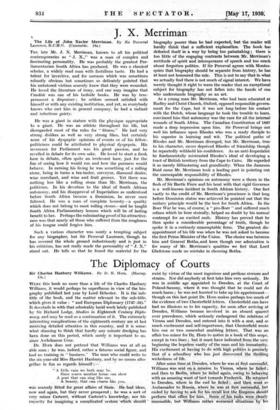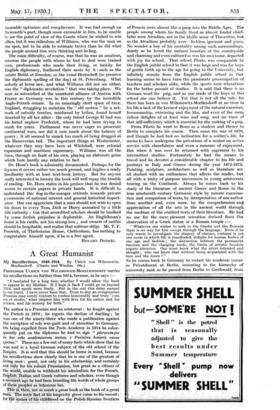The Diplomacy of Courts
Sir Charles Hanbury Williams. By D.. B. Horn. (Harrell. lbs., WERE this book no more than a life of Sir Charles Hanbury Williams, it would perhaps be superfluous in view of thebio- graphy published lait year by Lord -fichester. is the -Sub-
title of the 'book, and the matter relevant to the sub-title, which gives it value : " and European Diplomacy (1747-58)." It dovetails in with that admirably IuCid work lately published
by Sir Richard Lodge, Studiei in Eighteenth Century Diplo- macy, and may be read as a continuation of it. The extremely
interesting complications of the eighteenth century are at last receiving detailed attention in this country, and it is some-
what shaming to think that -hardly any minute dredging has been done on this period, which surely is important to us,
since Archdeacon Coxe. - Dr. Horn does not pretend that Williams was at all an
able man : he was, indeed, rather a fatuous social figure, and had no training in " business." The man-who' could write to the six-year-old Miss Harriet Hanbury, and by no means alto- gether in fun as regards himself
"A little 'vain we both may Since scarce another house can shew A poet that can sing like me,
- -A- beauty, that can charm like you,
was scarcely fitted for great affairs of State. " He: had ideas, now and again, but they never prospered ; he was a sort of 'very minor Carteret, without Carteret's knowledge, nor his capacity for imagining a complicated systeni. 'which - should
exist by virtue of the most ingenious and perilous stresses and strains. Nor did anybody at first take him very seriously. He was in middle age appointed to Dresden, at the Court of Poland-Saxony, where it was thought that he could not do much harm ; he was not hurried to take up his appointment— though on this last point Dr. Horn makes perhaps too much of the evidence of two Chesterfield letters. Chesterfield can have had no illusions as to his capacity, for soon after arriving at Dresden, Williams became involved in an absurd quarrel over precedence, which seriously endangered the relations of Vienna and Dresden, and entered into it with a zest, and so much excitement and self-importance, that Chesterfield wrote him one or two somewhat snubbing letters. That was an affair too minor for Dr. Horn to notice in a book of this scope, except in two lines ;. but it must have indicated from the very beginning the hopeless vanity of the man and his immaturity. His excitement at having to do with high politics is precisely that of a schoolboy Who has just discovered the thrilling wickedness of life.
After some time at Dresden, where he was at first successful, Williams. was sent on a mission to Vienna, where he failed ; and then to Berlin, -Where he failed again, owing to behaving with an amazing want of tact towards Frederick. He returned to Dresden, where in the end he failed ; and then, went as :Ambassador to Russia, where he was at first successful, but ended by having to ask for his recall lest the Empress should perform that office- for him. Some of his tasks were clearly impossible. but Williams rather worsened situations by his
incurable optimism and complacence. It was bad enough on Newcastle's part, though more excusable in him; to be unable to see the point of view of the Courts where he wished to win allies, but it was ridiculous of Williams, who was the man on the spot, not to be able to estimate better than he did what the people around him were thinking and feeling.
The main difficulty, of course, was that he was an, amateur, whereas the people with whom lie, had to deal were trained men, professionals who made their living, or luckily for English diplomacy, feathered their nests by it : such as the astute Briihl at Dresden, or-the venal Bestueheff (to preserve the diplomatic spelling of the day) at. St. Petersburg. What , nobody at home saw, and what Williams did not see either*, was the " diplomatic revolution ". that was taking:place. We were as astonished at the unnatural alliance of Austria with France as Germany was, in this century by the incredible Aaglo-French;enietne. In an amazingly- short space of time, England, struggling to maintain the " old system " by a, net- work of subsidy. treaties, reinforced by bribes, found herself deserted by all her .allies : . the only friend George II had was his hated nephew Frederick, whom he had been trying to crush for years._ Parliament was never eager to prosecute continental wars, nor (lid it care much about the balance of power ;- it all seemed to smack too much of being dragged at the Hanoverian tail. _ The important things ,at Westminster,. whatever they may have been at Whitehall, were colonial expansion and maritime supremacy. Williams was all the time, through no fault of his own, playing an elaborate game which bore hardly any relation to fact.
Dr. Horn's book is admirably documented. Perhaps for the layman it covers rather too much ground, and implies a ready familiarity with at least text-book history. But for anyone really interested in history the book will well repay the trouble of reading. Dr. Horn states in his preface that he was denied , access to certain papers in private hands. It is difficult to understand this, dog-in-the-manger attitude towards private possessions of national interest and general historical import- ance. One can appreciate that a man should not wish to open his doors to every _Tom, Dick or Harry animated by a little idle curiosity ; but that accredited scholars should be baulked by some foolish prejudice is deplorable. An Englishman's home is his castle, not his, strong-box ; and owners of castles, should be hospitable, and realize that noblesse oblige. Mr. T. F. Fenwick, of Thirlestaine House, Cheltenham, has nothing to congratulate himself upon, if he is a free agent.
BONAMY DOBRiE.















































 Previous page
Previous page